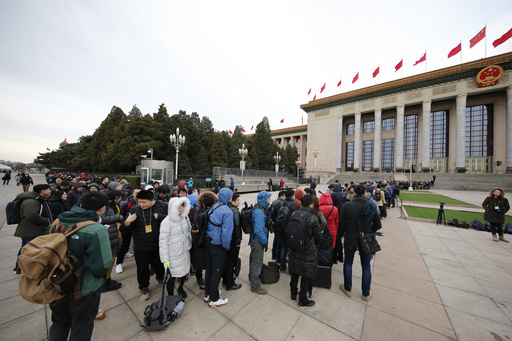
Local and foreign journalists line up to enter the Great Hall of the People to cover the opening session of the annual National People’s Congress in Beijing, Sunday, March 5, 2017. China’s top leadership as well as thousands of delegates from around the country are gathered at the Chinese capital for the annual legislature meetings. (AP Photo/Andy Wong)
BEIJING — Chinese Premier Li Keqiang pledged Sunday to make the country’s skies blue again and “work faster” to address pollution caused by coal burning.
His words to delegates at the opening of the annual National People’s Congress highlight how public discontent has made reducing smog, the most visible of China’s environment problems, a priority for the leadership.
In a report to China’s ceremonial legislature, Li said that “people are desperately hoping for” faster progress to improve air quality. “We will make our skies blue again,” he declared to almost 3,000 delegates in the Great Hall of the People.
He said the government intends over the next year to step up work to upgrade coal-fired power plants to achieve ultra-low emissions and energy conservation, and prioritize the integration of renewable energy sources into the grid.
Building on publicly available real-time and hourly readings from coal plants and other factories, Li said: “All key sources of industrial pollution will be placed under round-the-clock online monitoring.”
Environmental groups welcome the disclosure of such data because it allows the public to directly supervise the emissions of plants in their areas.
Lauri Myllyvirta of Greenpeace said they had expected the government to announce a speeding up of measures because air pollution is supposed to hit targets this year that were laid down in 2013. They include a 25-percent reduction in the density of fine particulate matter — a gauge of air pollution — in Beijing and the surrounding region from 2012 levels.
“It will require very dramatic steps to achieve those targets for this year,” Myllyvirta said.
He said they also hoped to see a measurable target for reducing wasted wind and solar-power generation capacities, “because that’s when different parts of the government will be really held accountable for integrating wind and solar fully into the grid.”
Li also said the government would ramp up efforts to deal with vehicle emissions by working faster to take old vehicles off the roads and encourage the use of clean-energy cars.
He said that they will “strictly enforce” environmental laws and regulations and that officials who do a poor job in enforcing the law or respond inadequately to worsening air quality will be held “fully accountable,” without giving details. Local officials have often been lax at enforcing regulations on companies that contribute to economic growth in their areas.
Official data show an improvement in China’s air quality since 2013, when the government brought out its air pollution action plan. However, residents in cities including Beijing still regularly breathe in levels of pollution several times higher than the recommended safe limit, and use apps to monitor air quality./rga